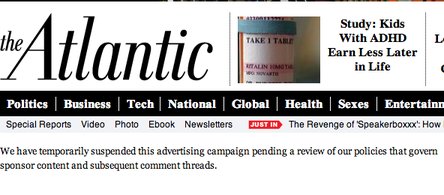The Strategist picks the day’s most relevant and interesting stories about the world of content from around the web. Here’s what you should be reading today:
The Atlantic’s Scientology Post
The Atlantic issued an apology for printing a scientology ad that looked like an article as part of its sponsored content campaigns, The New York Times reports.

Simply stating, “We screwed up,” the apology came after it printed a blog post titled “David Miscavige Leads Scientology to Milestone Year” on Monday. The sponsored content was panned: Gawker called it “bizarre, blatant propaganda for Scientology.” The Atlantic removed the post and is reviewing its sponsored content policies.
More than 11 Billion Online Video Ads Watched Last Month
According to ClickZ’s James Dohnert, a comScore study found that consumers watched 11.3 billion online video ads in December.
Among all videos viewed online, ads made up for 22 percent, and ads from Google sites received most of those views.
Behind Google were Hulu, Adap.TV, and LiveRail. The study also found that 84.9 percent of the U.S. population watched a video online last month.
The Art of Hashtags
Business2Community’s Jamie Cartwright writes about hashtags and how to make them effective. Hashtags need to help brands build their identity and Twitter presence.
Instead of using popular keywords that everyone else is talking about, company’s need to put out ones that define their personas. Companies can see what hashtags are already popular on Hashtagify.me and use that information in their own campaigns.
Guggenheim’s New Digital Media Head
Ross Levinsohn, interim CEO at Yahoo, was deemed CEO of a new media division at Guggenheim Partners, reports the Wall Street Journal.
Guggenheim Partners owns Hollywood Reporter, Adweek, and Billboard. Guggenheim Digital Media is set to work with Dick Clark Productions to flesh out its strategy.
Levinsohn said, “GDM has a powerful and competitive portfolio of iconic media assets today, and I look forward to identifying new opportunities for growth as the media and technology industries continue to rapidly evolve.”
What Makes Content Popular
CopyBlogger’s Paul Jun writes about what makes content catch like wildfire. When writers show vulnerability in their work, the story is honest, and people are able to form emotional connections to work.
Compelling stories told in simple and direct language are going to be popular as well. Writers need to ask themselves why and they will figure out their purpose in creating content.
He asks, “Why do you do what you do? Why should we believe in your message? How do I not only feel a part of your journey, but also accept it as my own? The moment you can clearly communicate your ‘Why,’ your vulnerability and storytelling will fortify your platform, ideas, and the spreading of your message.”
The Stress of Freelancing
InspirationFeed gives some helpful tips on how freelancers can overcome their stress. Freelancers should take some time to hone their craft, which will put their mind at ease.
Instead of only connecting on social networks, freelancers should go out, hang out with people, and meet new friends. Managing finances will help cut back on stress as well.
Freelancers need to stop comparing themselves to others, because “Everyone grows at a different pace and what you might excel in some else might lack in. Never get caught up with other people successes, but merely focus on developing your innate abilities and the world will open up to you. It’s much easier said than done.”
ShareCare by Dr. Oz and WebMD’s Jeff Arnold
According to Mashable, ShareCare, a new health vertical created by WebMD’s Jeff Arnold and co-sponsored by Dr. Oz, will allow users to “find health experts, connect and share stories, and get information on topics ranging from the flu to autism.”
Dr. Oz says that the site is “Facebook with health info” and that it will contribute to engaging the public on health issues. Last year, a Pew study found that 59 percent of adults in the U.S. searched for health information on the Internet.